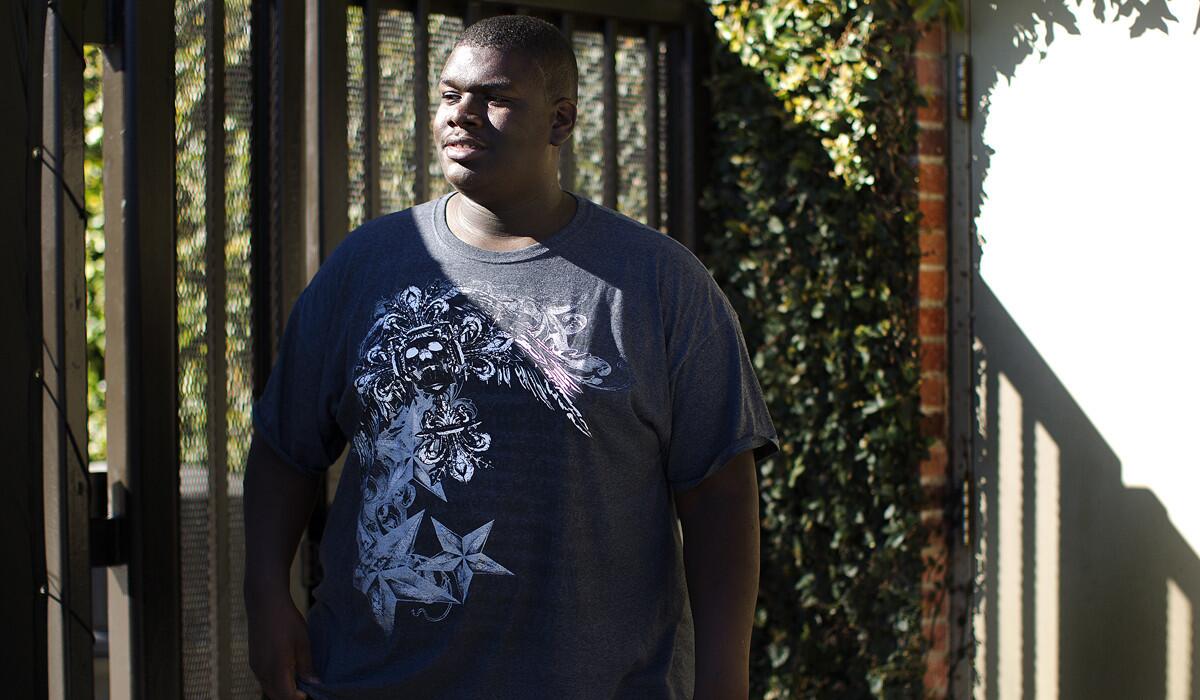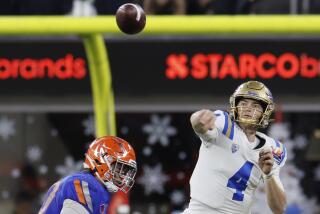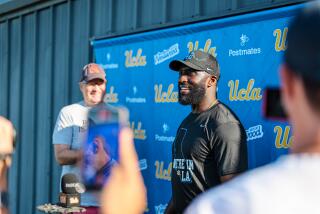Former UCLA offensive lineman Lacy Westbrook is still protecting Bruins

Former UCLA offensive lineman Lacy Westbrook guards the gate during practice at UCLA on Oct. 11.
Lacy Westbrook opens the gate to UCLA’s football practice field. Or, he makes sure it stays closed.
“I make sure no one comes in who shouldn’t or is recording any practices,” he says.
It’s mundane work that requires little physical exertion out of a 6-foot-4, 320-pound young man who not too long ago used his imposing size and strength to move defensive linemen around the field.
But it’s a role with the UCLA football team and Westbrook performs it with pride.
It’s a little something he can do to help.
It has been four years since Westbrook was an offensive lineman preparing to play for the Bruins. Four years since he collapsed while running laps with his father at Artesia Gahr High.
The aneurysm he suffered ended his football career but did not derail his life.
He is on schedule to graduate from UCLA next spring with a degree in history. After that, he is pondering graduate school, with ideas of becoming a professor or historian, or maybe a museum curator.
But while his playing career is in the past, Westbrook wasn’t ready to stay away from the game entirely. So, for now, he’s also the gatekeeper.
“I missed football,” he says. “I wanted to get involved again.”
Last week was the toughest of the season for him. UCLA played Stanford, a team that takes pride in its ability to impose its will on opponents. Butting heads with the type of players who man the Cardinal defensive line was what Westbrook had lived for, but all he could do was watch.
“I wouldn’t want to brag, but I was all about the run blocking,” he says. “Getting in the trenches and moving that man out of the way, that was my thing.”
Westbrook played at Compton Dominguez High and credits the game for who he has become. “Football saved my life,” he says. “It opened doors for me.”
Westbrook was straight out of Compton, and all that can entail. Around his neighborhood was trouble, the disadvantages many, he says. Yet he found his way.
“Being in Compton, with all the dangers, gangs, and the drugs and the violence, football motivated me to go to school and get good grades,” he says. “My parents, of course, they were on me.”
Stephanie Westbrook says her son never gave her problems. But she was vigilant.
“If you were involved with my son, you were involved with the whole family,” she says. “Me, his dad, aunts, uncles, would constantly talk to him about who you chose as friends.”
In the classroom, Westbrook had an intellectual’s love for history. On the field, he was a “mauler,” UCLA line coach Adrian Klemm recalls.
Auburn and Washington wanted him, but he also had offers from Duke and Dartmouth because of his academic qualifications.
“Football made it possible,” Westbrook says. “It motivated me to do well on tests, get a good grade-point average, do well on the ACT and SAT.”
He had graduated from Dominguez and was preparing for college football when he collapsed during a July run at Gahr High.
His father, also Lacy, rushed over to his son but found him unconscious.
Westbrook was treated for dehydration at a local emergency room, but his head was pounding “like someone was stabbing me in the brain.”
A CT scan revealed the aneurysm and he was taken to UC Irvine Medical Center to await surgery.
The whole time, it was Westbrook who was cheering up family and friends. “He was never, ‘Woe is me,’ ” Stephanie Westbrook says.
Recalls Klemm: “It was really encouraging going over there, not knowing what to expect, and seeing that positive attitude.”
Westbrook, no relation to former UCLA basketball player Russell Westbrook, was released from the hospital 10 days later with hopes of resuming his football career. UCLA’s team doctor ruled against it because of liability issues, but the school kept him on scholarship..
“Knowing football wasn’t going to be for him was a struggle,” Stephanie Westbrook said. “It took a lot of checking in on him, encouraging him, telling him that there was a greater purpose.”
UCLA Coach Jim Mora says “there was a period of mourning” about the end of a promising career, but when Westbrook approached him about staying involved in the football program he could not refuse.
“With all he went through, I just love the fact that even though he wasn’t going to play football, it was important for him to get a degree,” Mora says.
Along with manning the practice gate, Westbrook ushers visiting recruits at the Rose Bowl on game days.
“He found out he had a purpose,” Stephanie Westbrook says.
Some mornings it’s opening a gate. The rest of the time, it’s about opening his mind, learning from the past and engaging a bright future..
Twitter: @cfosterlatimes
More to Read
Go beyond the scoreboard
Get the latest on L.A.'s teams in the daily Sports Report newsletter.
You may occasionally receive promotional content from the Los Angeles Times.







